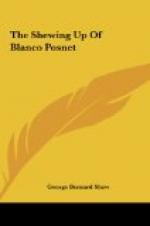LORD GORELL’S AWAKENING
In the meantime, conceive the situation which would arise if a licensed play were prosecuted. To make it clearer, let us imagine any other offender—say a company promoter with a fraudulent prospectus—pleading in Court that he had induced the Lord Chamberlain to issue a certificate that the prospectus contained nothing objectionable, and that on the strength of that certificate he issued it; also, that by law the Court could do nothing to him except order him to wind up his company. Some such vision as this must have come to Lord Gorell when he at last grappled seriously with the problem. Mr. Harcourt seized the opportunity to make a last rally. He seconded Lord Gorell’s proposal that the Committee should admit that its scheme of an optional censorship was an elaborate absurdity, and report that all censorship before production was out of the question. But it was too late: the volte face was too sudden and complete. It was Lord Gorell whose vote had turned the close division which took place on the question of receiving my statement. It was Lord Gorell without whose countenance and authority the farce of the books could never have been performed. Yet here was Lord Gorell, after assenting to all the provisions for the optional censorship paragraph by paragraph, suddenly informing his colleagues that they had been wrong all through and that I had been right all through, and inviting them to scrap half their work and adopt my conclusion. No wonder Lord Gorell got only one vote: that of Mr. Harcourt. But the incident is not the less significant. Lord Gorell carried more weight than any other member of the Committee on the legal and constitutional aspect of the question. Had he begun where he left off—had he at the outset put down his foot on the notion that an optional penal law could ever be anything but a gross contradiction in terms, that part of the Committee’s proposals would never have come into existence.




